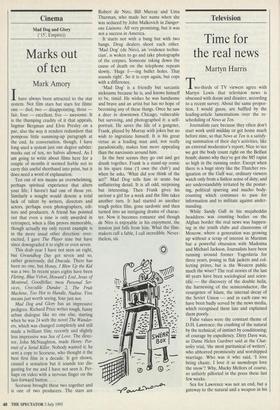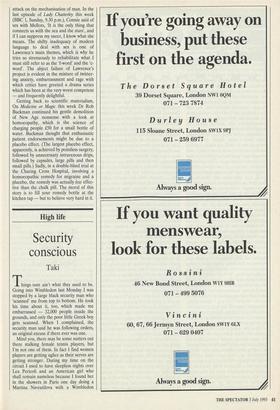Television
Time for the real news
Martyn Harris
Two-thirds of TV viewers agree with Martyn Lewis that television news is obsessed with doom and disaster, according to a recent survey. About the same propor- tion, I would guess, are baffled by the leading-article lamentations over the re- scheduling of News at Ten.
Journalists care because they often don't start work until midday or get home much before nine, so that News at Ten is a satisfy- ing summation of their day's activities, like an external moderator's report. Nice to see we got the body count right on the Belfast bomb; dunno why they've got the M5 rapist so high in the running order. Except when there is a huge story like the Thatcher res- ignation or the Gulf war, ordinary viewers watch only from a listless sense of duty, and are understandably irritated by the postur- ing, political sparring and macho body- counting which continues to pass for information and to militate against under- standing.
While Sandy Gall in his mujaheddin headdress was counting bodies on the Afghan border the real news was happen- ing in the youth clubs and classrooms of Moscow, where a generation was growing up without a scrap of interest in Marxism but a powerful obsession with Madonna and Michael Jackson. Journalists have been running around former Yugoslavia for three years, posing in flak jackets and col- lecting prizes, but is the Western public much the wiser? The real stories of the last 40 years have been sociological and scien- tific — the discovery of the double helix, the harnessing of the semiconductor, the resurgence of Islam, the internal decay of the Soviet Union — and in each case we have been badly served by the news media, which recognised them late and explained them poorly.
False values were the constant theme of D.H. Lawrence: the crushing of the natural by the technical; of instinct by conditioning; of courage by expediency. Dirty Dave was, as Dame Helen Gardner said at the Chat- terley trial, 'the most puritanical of writers', who abhorred promiscuity and worshipped marriage. Who was it who said, 'I love being chaste. I love it as snowdrops love the snow'? Why, Mucky Mellors of course, so unfairly pilloried in the press these last few weeks.
Sex for Lawrence was not an end, but a gateway to the natural and a weapon in his attack on the mechanisation of man. In the last episode of Lady Chatterley this week (BBC 1, Sunday, 9.30 p.m.), Connie said of sex with Mellors, 'It is the only thing that connects us with the sea and the stars', and if I can suppress my sneer, I know what she means. The shifty inadequacy of modern language to deal with sex is one of Lawrence's main themes, which is why he tries so strenuously to rehabilitate what I must still refer to as the 1-word' and the 'c- word'. The abject failure of Lawrence's project is evident in the mixture of twitter- ing anxiety, embarrassment and rage with which critics have greeted a drama series which has been at the very worst competent — and frequently delightful.
Getting back to scientific materialism, On Medicine or Magic this week Dr Rob Buckman continued his gentle demolition of New Age nonsense with a look at homoeopathy, which is the science of charging people £50 for a small bottle of water. Buckman thought that enthusiastic patient endorsements might be due to a placebo effect. (The largest placebo effect, apparently, is achieved by pointless surgery, followed by unnecessary intravenous drips, followed by capsules, large pills and then small pills.) Sadly, in a double-blind trial at the Charing Cross Hospital, involving a homoeopathic remedy for migraine and a placebo, the remedy was actually less effec- tive than the chalk pill. The moral of this story is to fill your remedy bottle at the kitchen tap — but to believe very hard in it.



















































 Previous page
Previous page